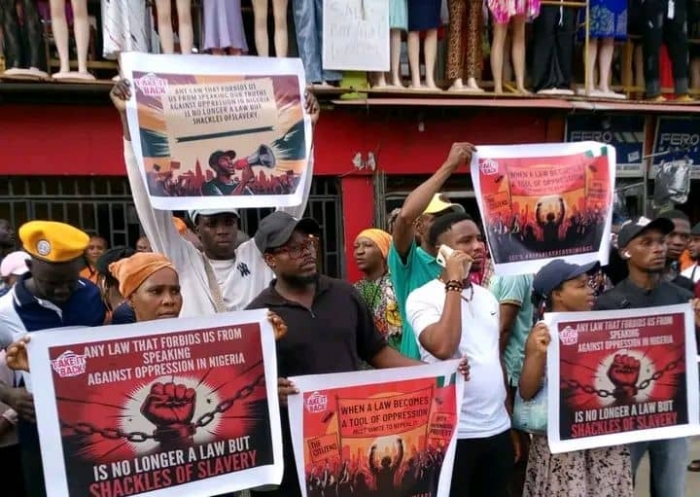Security forces on Monday violently dispersed protesters across Nigeria as the Take-It-Back Movement staged nationwide demonstrations against the declaration of a state of emergency in Rivers State, the alleged misuse of the Cyber Crime Act, and worsening economic hardship.
The crackdown, which saw police firing tear gas, deploying helicopters for aerial surveillance, and arresting activists, drew sharp condemnation from rights groups, including Amnesty International.
In Abuja, armed officers disrupted the protest early in the morning, arresting at least two demonstrators—identified as Flagboy and Abosede — while journalists and bystanders were caught in the chaos. Prominent activist and former presidential candidate Omoyele Sowore joined the rally, resisting police attempts to shut it down.
A similar confrontation unfolded in Lagos, where police, backed by soldiers and civil defense operatives, blocked protesters from delivering a petition to the state assembly. Juwon Sanyaolu, national coordinator of the movement, accused authorities of violating constitutional rights to peaceful assembly.
“They are impeding our rights to movement and protest. This is a warning action—if the government fails to listen, we will return in August with a protest that shakes the nation,” Sanyaolu declared.
Police Deny Violence, Claim Protesters Were "Miscreants"
The Rivers State Police Command denied allegations of brutality, insisting officers only dispersed “miscreants” stealing from the public. However, eyewitnesses reported security forces firing live bullets and tear gas, injuring a protester and briefly detaining journalists.
Solomon Menu, a civil society leader in Rivers, vowed that protests would continue despite the repression. “Freedom is not free. They used brute force today, but we will regroup,” he said.
Mixed Responses Across States
While protests were suppressed in Abuja, Lagos, and Port Harcourt, demonstrations proceeded peacefully in Osogbo, Ibadan, and Benin, where activists condemned the Cyber Crime Act as a tool to suppress dissent.
In Jos, a low turnout was attributed to intimidation, with coordinator Jonah Onah stating, “People are scared, but even if I’m alone, I’ll protest. Our leaders have failed us.”
Police Accuse Protesters of Sabotaging "National Police Day"
The Nigeria Police Force had earlier warned against the protests, accusing organizers of deliberately undermining National Police Day — a government-designated event celebrating security forces.
Olumuyiwa Adejobi, police spokesperson, called the demonstrations “ill-timed and mischievous,” urging activists to engage in dialogue instead.
Rights Groups Condemn Crackdown
Amnesty International Nigeria condemned the police response as a “serious violation of human rights.” Country Director Isa Sanusi stated, “The government is not willing to listen. Nigerians cannot tolerate this assault anymore.”
Musa Rafsanjani of the *Civil Society Legislative Advocacy Centre criticized the police for attacking peaceful protesters, contrasting Nigeria’s approach with global standards where security forces protect demonstrators.
Government Defends Restrictions
The Lagos State government cited a recent court order restricting protests to Gani Fawehinmi Freedom Park and Peace Park, warning that violators would be held liable for damages.
Despite the crackdown, activists vowed to continue mobilizing, demanding an end to emergency rule in Rivers, the repeal of the Cyber Crime Act, and accountability for human rights abuses.
"Enough is enough," declared Sanusi. "We are documenting these violations, and the world is watching."
